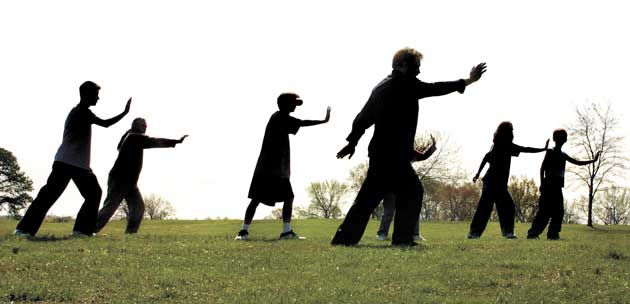New year, new you: Upgrade your life with a short course
What will it be – an ancient form of combat or knitting for beginners? Caitlin Davies provides inspiration for learning new talents in 2009

Your support helps us to tell the story
From reproductive rights to climate change to Big Tech, The Independent is on the ground when the story is developing. Whether it's investigating the financials of Elon Musk's pro-Trump PAC or producing our latest documentary, 'The A Word', which shines a light on the American women fighting for reproductive rights, we know how important it is to parse out the facts from the messaging.
At such a critical moment in US history, we need reporters on the ground. Your donation allows us to keep sending journalists to speak to both sides of the story.
The Independent is trusted by Americans across the entire political spectrum. And unlike many other quality news outlets, we choose not to lock Americans out of our reporting and analysis with paywalls. We believe quality journalism should be available to everyone, paid for by those who can afford it.
Your support makes all the difference.For 40 years, Sandra Walton worked as a primary-school headteacher. "My life was dominated by learning," she says. "I knew everything about assessments, curriculum and management, but it wasn't learning the way I'm learning now – this is like a reawakening for me." Walton has just signed up for a 10-week course in the Chinese martial art t'ai chi.
She's a student at Birmingham's Botanical Gardens, where she previously studied watercolour painting and a course entitled "De-stress Your Life and Let the Sunshine In". There are 15 other students on her new t'ai chi course, ranging in age from 45 to 80. "The teacher treats us all with great respect," she says, "regardless if you have to hold on to the wall to do the movements."
Walton is one of thousands of adult learners looking for ways to refresh both body and mind. She wants to develop herself as a person, one of the most common reasons for taking a short course, according to the National Institute for Adult Continuing Education (NIACE). Its most recent learning survey found that while adult learners are keen to improve their employment opportunities, they are just as driven by a desire for self-fulfilment.
The Botanical Gardens runs weekend workshops and daytime and evening courses in its purpose-built study centre. Fees vary from £20 for knitting for beginners to £90 for practical photography with digital cameras. The day and evening courses usually last 10 weeks, and normally cost £45.
T'ai chi and reiki, the Japanese technique for stress reduction and relaxation, are proving particularly popular. Such is the demand that extra courses have been introduced for the New Year.
"People seem to like doing something active," says the gardens' education officer, Deborah Knott, "and this is a very peaceful setting, with a calm-ing building and lovely views of the 15-acre grounds."
Horticulture courses are not as popular as they were, but the Royal Horticultural Society has a range of qualifications. The Level 2 Certificate in Horticulture is ideal for amateurs.
Business-management and IT courses are useful. Most adult learners are keen to take a course that will help them in their job, or they want a recognised qualification: learndirect has a wide range of online courses starting from £19.99, and many of the IT and management courses lead to qualifications.
Another option is to learn a new language. The Open University runs distance-learning courses in French, German and Spanish, and beginner's courses in Italian and Welsh. Many courses start in February, but they tend to be on the intermediate level.
"Be clear about what you want to do and why," says Teresa Tinsley, the director of communications at Cilt, the National Centre for Languages. "You have to practise the skills you learn, especially listening and speaking." So if you're taking a written course in Spanish, you'll need to practise your conversational skills too.
Tinsley says that short courses can be especially useful because they tend to be intensive. There are also more blended courses available now, with a mixture of online and face-to-face learning, such as those offered by the Instituto Cervantes in London. It runs a 15-week part-time Spanish course for £150.
Language websites can help you find conversational partners, while podcasts (online audio or video recordings) are becoming the latest way to learn. Coffee Break Spanish, part of the Radio Lingua Network, uses podcasts as integral learning tools. A six-month subscription starts from £27.
"Learning a new language such as French is more than just wanting to know how to buy a baguette," says Alastair Clark, senior development officer at NIACE. "It's the way people change their view of themselves by learning another language."
Meanwhile, Sandra Walton is looking forward to doing t'ai chi out on the lawn of Birmingham's Botanical Gardens once spring arrives. "I have a sense of achievement, and I'm learning something new. I'd have a go at anything now!"
Birmingham Botanical Gardens www.birminghambotanicalgardens.org.uk; Directgov www.direct.gov.uk/en/Education AndLearning/AdultLearning; RHS www.rhs.org.uk; Cilt www.cilt.org.uk; learndirect www.learndirect.co.uk; Open University www.open.ac.uk; Instituto Cervantes www.londres.cervantes.es; Radio Lingua www.radiolingua.com
Join our commenting forum
Join thought-provoking conversations, follow other Independent readers and see their replies
Comments